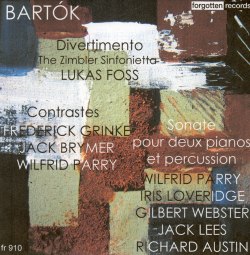| 
|
Belá BARTÓK (1881-1945)
Divertimento for strings Sz 113 (1) [23:43]
Sonata for two pianos and percussion Sz 110 (2) [24:09]
Contrastes for violon, clarinet and piano Sz 111 (3) [17:02]
Zimbler Sinfonietta/Lukas Foss (1)
Wilfrid Parry (2, 3), Iris Loveridge (2) (piano)
Gilbert Webster (2), Jack Lees (2) (percussion)
Richard Austin (2) (director)
Frederick Grinke (3) (violin)
Jack Brymer (3) (clarinet)
rec. 1955 (1); 1956 (2; 3)
FORGOTTEN RECORDS FR 910 [64:55]
Welcome indeed are these three Bartók recordings of the LP era, lovingly restored by Forgotten Records. They all date from the mid-’fifties. This version of the Divertimento, which for me is the highlight, will be known to many collectors, having had several LP incarnations on Siena Records, Unicorn and Turnabout. The recording under review here has been digitally re-mastered from a good Musical Masterpiece Society (MMS 2175) copy. You wouldn’t think it originated from 1955, such is the full-bodied and crisply defined sound. The Sonata for Two Pianos and Percussion and the Contrasts don’t exhibit the same diaphanous translucency. They were obviously recorded in a less resonant and boxy acoustic and sound more a product of their age, Bam (LD 033) and Westminster/Argo (XWN 18425) being the source copies.
The Divertimento for strings was a commission by the Swiss conductor Paul Sacher, and was the last work Bartók composed in 1939 before he fled Hungary for the States at the outbreak of World War II. The recording here is in remarkably good, clear sound for its age. Foss kicks off with a rhythmically alert opening. In the molto adagio second movement, he captures the dark, sinister and melancholic strands in the score. There’s a sense of foreboding, with a restless undercurrent of tension and suspense underpinning this menacing music. The sun comes out in the third movement, bringing some relief. There’s real swagger and energy in the dance-like rhythms, with Foss and his players achieving an ideal balance in the interplay between soloists and full orchestra.
Predating the Divertimento by two years, the Sonata for Two Pianos and Percussion was composed in 1937. The first performance, a year later, was given by Bartók himself at the piano, together with his second wife Ditta Pásztory-Bartók, with Saul Goodman and Henry Deneke on percussion at the International Society for Contemporary Music in& Basel, Switzerland. From the outset it was a success, garnering rave reviews. It has gone on to become one of the composer’s most regularly performed works.
The Sonata has rhythmic vitality. Richard Austin, who directs the performance, inspires real drive, energy and, most of all, precision from the instrumentalists. The first movement grows and evolves from the slow, portentous opening, and the contrasting tension/relaxation of the narrative is maintained throughout. The entire range of the piano as a percussive instrument is displayed. The dialogue between pianists and percussionists show a sense of shared purpose. Sensitivity to dynamic range and polyrhythmic structure is apparent from start to finish.
Bartók composed Contrasts in 1938 for the violinist Joseph Szigeti, the clarinetist Benny Goodman and himself. Originally a two movement work, a middle movement was later added. The work contrasts the different sonorities of the three instruments. In tribute to Goodman and Szigeti, Bartók flavours the piece with jazz and classical character. Each movement is a contrast in itself, displaying varying moods and tempi. Bartók and his two dedicatees made a recording of the work in 1940, and the sixteen years difference in the recording techniques of the two recordings is striking. The Szigeti/Goodman/Bartók version has a slightly more resonant ambience, with all three instruments being recessed. This results in some loss of clarity and definition. The recording sounds dated. The version here is recorded in a warmer, more forward and intimate acoustic, much preferable, allowing instrumental detail to emerge. Interpretatively the two versions are not poles apart, but if I have to nail my colours to the mast: the Grinke/Brymer/Parry reading would be my preferred choice.
If you’re like me, a Bartók enthusiast, then this release is a worthy acquisition. Internet links for relevant information are given on the back tray insert. No notes are included. This latest offering from Forgotten Records definitely has the thumbs up from me.
Stephen Greenbank
 |
 |
|











